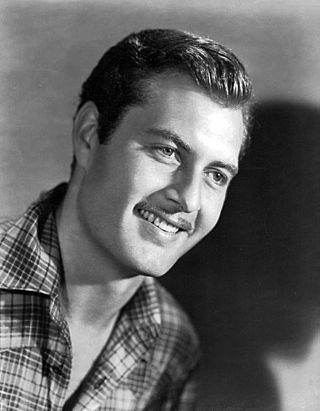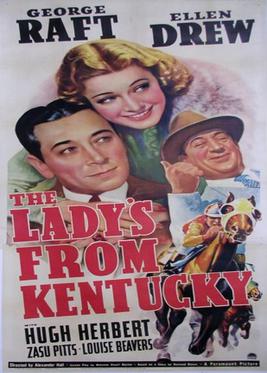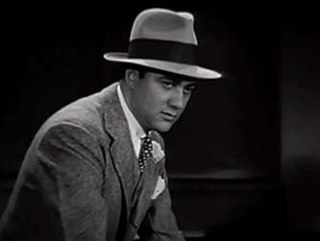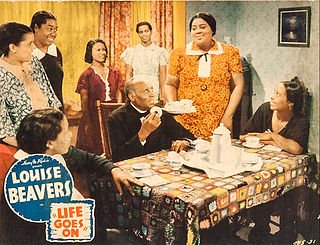Related Research Articles

George Raft was an American film actor and dancer identified with portrayals of gangsters in crime melodramas of the 1930s and 1940s. A stylish leading man in dozens of movies, Raft is remembered for his gangster roles in Quick Millions (1931) with Spencer Tracy, Scarface (1932) with Paul Muni, Each Dawn I Die (1939) with James Cagney, Invisible Stripes (1939) with Humphrey Bogart, and Billy Wilder's comedy Some Like It Hot (1959) with Marilyn Monroe and Jack Lemmon; and as a dancer in Bolero (1934) with Carole Lombard and a truck driver in They Drive by Night (1940) with Ann Sheridan, Ida Lupino and Bogart.

Louise Beavers was an American film and television actress who appeared in dozens of films and two hit television shows from the 1920s to 1960. She played a prominent role in advancing the lives of Black Americans through her work and collaborated with fellow advocates to improve the social standing and media image of the Black population.

Invasion U.S.A. is a 1985 American action film produced by Cannon Films, and starring Chuck Norris. It was directed by Joseph Zito. It involves the star fighting off a force of Soviet/Cuban-led guerrillas.

George Montgomery was an American actor, best known for his work in Western films and television. He was also a painter, director, producer, writer, sculptor, furniture craftsman, and stuntman. He was married to Dinah Shore and was engaged to Hedy Lamarr.

John Ridgely was an American film character actor with over 175 film credits.

The Lady's from Kentucky is a 1939 film directed by Alexander Hall and starring George Raft and Ellen Drew. It was written by Malcolm Stuart Boylan from a story by Rowland Brown. The screenplay involves a failing bookie (Raft) who becomes half owner of a racehorse, with a Kentucky lady (Drew) owning the other half. ZaSu Pitts plays a supporting role.

Harry Lewis Woods was an American film actor.
Seton Ingersoll Miller was an American screenwriter and producer. During his career, he worked with film directors such as Howard Hawks and Michael Curtiz. Miller received two Oscar nominations and won once for Best Screenplay for the 1941 fantasy romantic comedy film, Here Comes Mr. Jordan, along with Sidney Buchman.

Ralph Cooper, was an American actor, screenwriter, dancer and choreographer. Cooper is best known as the original master of ceremonies and founder of amateur night at the Apollo Theater in Harlem, New York City, in 1935. He wrote, produced, directed and acted in ten motion pictures. Titles include The Duke Is Tops, Dark Manhattan, Gangsters on the Loose and Gang War. Because of his debonair good looks, he was known as "dark Gable" in the 1930s.

Romance of the Redwoods is a 1939 American adventure film directed by Charles Vidor and starring Charles Bickford, Jean Parker and Gordon Oliver. It is based on the 1899 short story The White Silence by Jack London.

Life Goes On is a 1938 crime drama directed by William Nolte and starring Louise Beavers, Edward Thompson, Reginald Fenderson, and Laurence Criner. It was produced by Million Dollar Productions, which created race films with African-American casts for distribution to "colored only" theaters during the years of segregation.

Leo C. Popkin (1914–2011) was a film director and producer in the United States. His brother Harry M. Popkin was the executive producer of Million Dollar Productions, a partnership that included Ralph Cooper.

Monte Hawley was an American actor from Chicago, Illinois.
One Dark Night is an American film released in 1939. Also known as Night Club Girl. It was directed by Leo C. Popkin. It was produced by Harry M. Popkin. The film features an African American cast including Mantan Moreland in a dramatic role.

Million Dollar Productions was a movie studio in the United States active from 1937 until 1940. It was established to produce films with African American casts. It was a partnership between Harry M. Popkin, Leo C. Popkin and Ralph Cooper.
While Thousands Cheer is a lost American film released in 1940. Leo C. Popkin directed. It was the only football-themed film with an African American lead character for decades. It starred Kenny Washington, a football star from UCLA who went on to become the first African American in the NFL after initially being refused an opportunity to play in the league due to segregation.

Gang Smashers, also released as Gun Moll, is an American film released in 1938. It features an African American cast. Leo C. Popkin directed the Million Dollar Productions film from a screenplay by Ralph Cooper. The University of South Carolina libraries have an 8-page pressbook for the film. Nina Mae McKinney stars in the film a thriller about the Harlem underworld and racketeering.
Reginald Hartley Fenderson was an American actor in theatrical productions and films in the United States. He appeared in various films with African American casts in the 1930s and 1940s.
Tom Southern, also known as Tommy or Thomas Southern, was an actor in American film and stage productions as well as a songwriter. He was a theater actor with the Lafayette Players.
Take My Life is an American film released in 1942. It featured a group of young actors known as the Harlem Tuff Kids. In this film they join the U.S. Army. The group also appeared in the 1939 film Reform School. Both were produced by Million Dollar Productions. Oakton Community College has a poster for the film in its collection. The poster includes the taglines Harlem Goes to War! and Thrill to the Brown Bombers in Action.
References
- 1 2 Dodson, Nell (6 May 1939). "Million Dollar Pictures Scores Dramatic Hit With "Reform School"". Afro-American. p. 11. ProQuest 531249052 . Retrieved 27 October 2020.
- ↑ Grant, Barry Keith (December 1, 2012). Film Genre Reader IV. University of Texas Press. ISBN 9780292745742 – via Google Books.
- ↑ ""Reform School" Brings Out Great Beavers' Talent". Atlanta Daily World. 17 Apr 1939. p. 2. ProQuest 490588296 . Retrieved 6 March 2021.
- 1 2 "Reform School at Apollo: Louise Beavers to Appear With Gripping "Dead End" Drama". New York Amsterdam News. 17 June 1939. p. 17. ProQuest 226146855 . Retrieved 6 March 2021.
- ↑ Gates (Jr.), Henry Louis; Higginbotham, Evelyn Brooks (November 25, 2009). Harlem Renaissance Lives from the African American National Biography. Oxford University Press. ISBN 9780195387957 – via Google Books.
- ↑ Harry, Levette (17 Apr 1939). "Louise Beavers "Tops" In "Reform School" Feature: Interpretation Is Best In Her Career". Atlanta Daily World. p. 2. ProQuest 490590358 . Retrieved 6 March 2021.